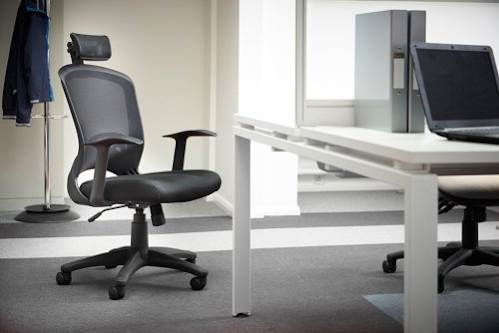Choosing the Right Office Furniture: A Guide to Visitor Chairs and Sit-Stand Desks
Modern workplaces are evolving rapidly, and with them, so are the expectations around comfort, productivity, and aesthetics. Choosing the right office furniture is no longer just about function—it’s about creating a professional environment that supports employee well-being and leaves a positive impression on visitors.
Two key
pieces that often get overlooked but play an essential role in this
transformation are the visitor chair
and the sit stand desk. Whether
you’re setting up a corporate space or upgrading a home office, understanding
these elements can make a huge difference.
Why Office Furniture Matters More Than Ever
Office
furniture influences not just the look and feel of a workspace, but also
impacts productivity, posture, and employee morale. Research shows that
ergonomic design can reduce physical strain and increase focus, leading to
higher job satisfaction and improved performance. Moreover, first impressions
count—and the furniture you choose reflects your brand’s professionalism and
attention to detail.
What is a Visitor Chair?
A visitor chair is typically placed in waiting
areas, reception zones, meeting rooms, or across desks for guests and clients.
It’s designed to provide short-term seating that’s both comfortable and
stylish. Unlike executive or task chairs, visitor chairs are often stationary,
with a focus on aesthetics and hospitality.
Characteristics of an Ideal Visitor Chair
- Comfortable Padding
While a visitor chair doesn’t require adjustable features, it must offer adequate support and cushioning to ensure comfort during brief stays. - Professional Aesthetics
Visitor chairs are an extension of your office design. Choose sleek, modern styles that complement your décor and communicate professionalism. - Durability
Since these chairs are frequently used by different individuals, they should be built with strong frames and quality materials to withstand regular use. - Space-Efficient Design
A compact and stackable design can help you manage space more effectively, especially in high-traffic areas.
Types of Visitor Chairs for Different Office Settings
Reception Area Chairs
These are
the first pieces of furniture that guests interact with. Prioritize comfort and
visual appeal. Materials like faux leather, mesh, and upholstered fabrics are
common.
Meeting Room Chairs
These
chairs should strike a balance between comfort and practicality. Lightweight
designs make it easier to reconfigure meeting setups quickly.
Desk-Side Visitor
Chairs
Placed
opposite workstations, these offer a comfortable seating option for short
meetings or consultations. Look for clean lines and subtle colors to maintain a
cohesive office look.
Enhancing Workspaces with Sit Stand Desks
In recent
years, the sit stand desk has become a popular choice for
professionals seeking better ergonomics and flexibility. These adjustable desks
allow users to alternate between sitting and standing, promoting movement
throughout the workday.
Benefits of a Sit Stand Desk
- Improved Posture and Health
Sitting for long periods has been linked to numerous health issues, including back pain, poor circulation, and fatigue. Sit stand desks help combat this by encouraging users to change positions regularly. - Boost in Productivity
Studies show that employees using sit-stand workstations report better focus and energy levels, especially in the afternoons. - Customizable Work Experience
With adjustable height settings, these desks cater to users of different heights and preferences, ensuring a more personalized workspace. - Encourages Movement
The ability to shift between positions reduces sedentary behavior and encourages healthier habits throughout the day.
How to Pair Visitor Chairs with Sit Stand Desks
While
visitor chairs are generally fixed-height, they can still complement sit stand
desks when positioned strategically in a workspace. Here’s how:
- Place visitor chairs near
standing desks for collaborative use. Visitors can remain seated while the employee
adjusts the desk to a comfortable standing height.
- Use minimalist visitor
chairs in hot-desking areas. This ensures that temporary workstations
remain uncluttered and visually balanced.
- Opt for neutral colors and
compact designs so
that the visitor chairs blend seamlessly with the adjustable nature of sit
stand desks.
Office Furniture Trends to Watch
As hybrid
work becomes the norm, the demand for functional yet stylish office furniture is only increasing. Here are a
few trends shaping the industry:
- Modular Furniture: Pieces that can be
reconfigured for different uses are gaining popularity in dynamic work
environments.
- Sustainable Materials: More businesses are opting
for eco-friendly options, including recycled fabrics and responsibly
sourced wood.
- Technology Integration: Desks with built-in
charging stations or cable management systems are on the rise.
- Ergonomic Design: Everything from visitor
chairs to standing desks is being designed with user comfort in mind.
Tips for Choosing Office Furniture That Works for You
- Assess Your Space
Measure your office area and identify key zones—reception, meeting rooms, individual workstations—before purchasing furniture. - Prioritize Comfort
Even guest seating should offer a pleasant experience. A well-designed visitor chair can help guests feel welcomed and respected. - Think Long-Term
Invest in furniture made with high-quality materials that won’t need replacing every couple of years. - Coordinate Styles
Maintain consistency across desks, chairs, and storage solutions to create a cohesive visual flow in your office. - Check Ergonomics
For workstations, sit stand desks offer the best ergonomic advantages, especially when paired with supportive chairs and proper monitor placement.
Final Thoughts
Choosing
the right visitor chair and
investing in a sit stand desk
can significantly enhance your office environment—both in terms of aesthetics
and functionality. As businesses strive to create spaces that are welcoming,
productive, and adaptable, the role of well-designed furniture cannot be
overstated.




Comments
Post a Comment